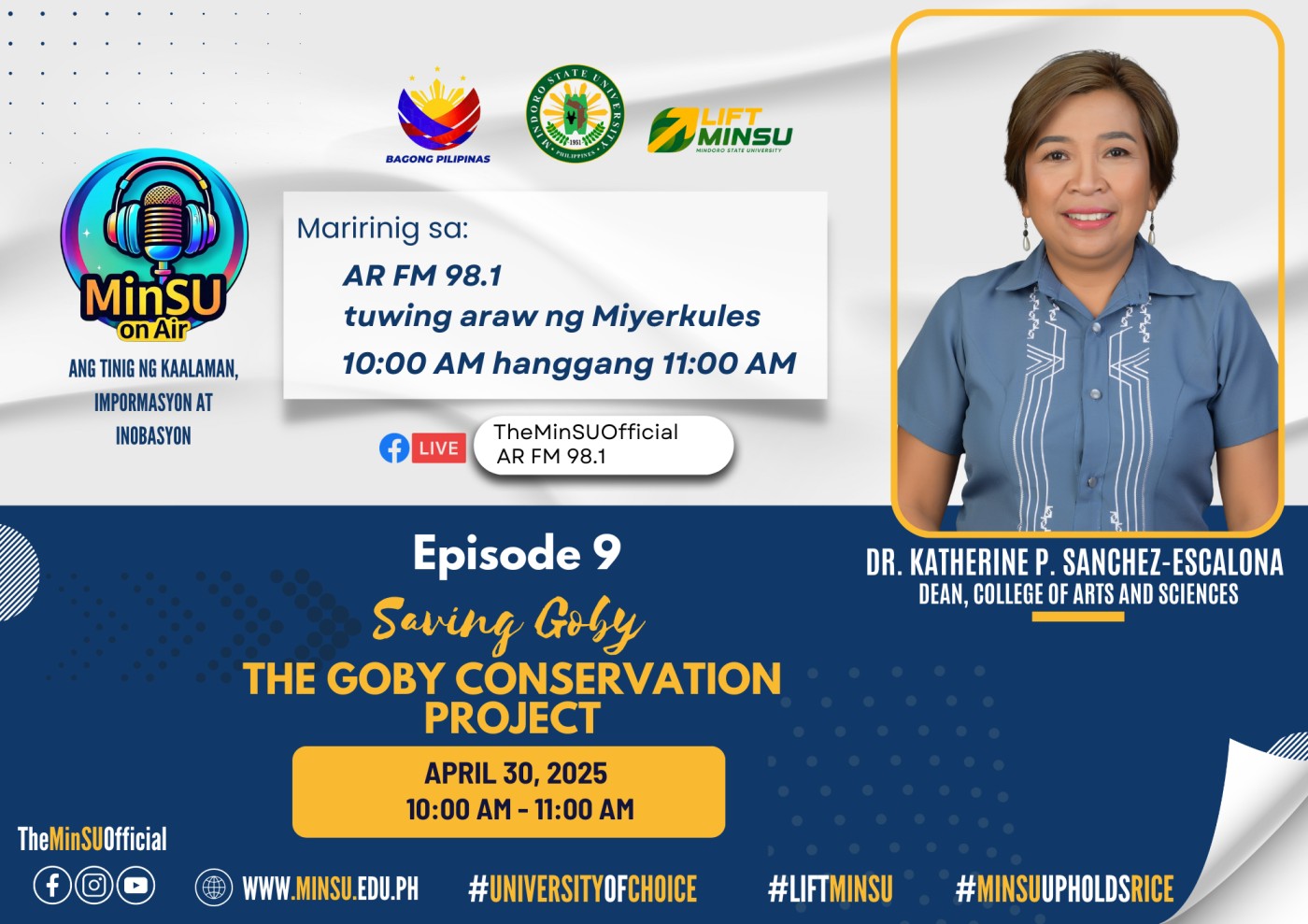
The conservation of Mindoro’s native goby fish was the focus of the latest episode of MinSU on Air, aired on Wednesday, April 30, 2025.
The episode shed light on the ongoing efforts of Mindoro State University (MinSU) to protect and conserve the Biyang Puti, a species of goby fish native to Naujan Lake in Oriental Mindoro.
Titled "Saving Goby: The Goby Conservation Project," Episode 9 featured a comprehensive discussion with Dr. Katherine P. Sanchez-Escalona, Professor and Dean of the College of Arts and Sciences at MinSU, and the project leader. The episode explored the pioneering research and conservation work being undertaken to protect and sustainably propagate the Biyang Puti, a native species of Naujan Lake.
“The Goby Conservation Project is not just for science, but also for the environment and the livelihood of the people of Mindoro,” said Dr. Escalona during the broadcast.
A First-of-Its-Kind Initiative
The Goby Conservation Project is the first initiative in the Philippines dedicated to the Biyang Puti found in Naujan Lake. Through genetic barcoding, MinSU researchers discovered that the local goby population comprises three distinct species, with Glossogobius aureus being the dominant type. The project focuses on conservation through aquaculture, enabling researchers not only to preserve the species but also to explore sustainable cultivation methods that offer livelihood opportunities for local communities.
Ecological Significance and Alarming Discoveries
Dr. Escalona emphasized the goby’s critical role in the lake’s ecosystem. Once abundant in the 1970s and 1980s, the species’ population has drastically declined due to overfishing and habitat degradation.
“The decline in the population of Biyang Puti has a direct impact on biodiversity and the livelihood of our fishers,” she noted.
Research conducted around Naujan Lake revealed an alarming ecological trend: the dominance of cyanophytes (blue-green algae), which signals pollution loading and potential eutrophication. This phenomenon can lead to oxygen depletion, thereby disrupting aquatic life. While nutrient levels in the lake sediments were found to be high, their limited availability in the water column adds further stress to aquatic organisms.
Aquaculture Breakthroughs and Challenges
Dr. Escalona and her team achieved notable success in breeding and hatching gobies using both natural and hormone-induced methods. They optimized broodstock conditioning and larval nutrition using live microalgae such as Nannochloropsis and Chlorella. Additionally, they established protocols for transitioning wild gobies into tank environments — a major milestone for freshwater aquaculture and conservation.
Despite these achievements, challenges remain, particularly in improving the survival rate from larval to post-larval stages. The team is now focused on enhancing larval nutrition, refining water quality management, and addressing disease outbreaks.
Interestingly, initial findings show that the feed conversion ratio (FCR) of wild-caught goby aligns with industry standards for farmed fish and shrimp, indicating promising potential for commercial aquaculture.
The Future of Goby
Despite the challenges, the MinSU Goby Conservation Project represents a significant step toward freshwater species conservation in the Philippines — much like earlier national efforts that supported the aquaculture of tilapia and bangus.
Dr. Escalona emphasized the importance of continued research and collaboration with government agencies and other organizations to further study Naujan Lake and expand the scope of the project. The initiative is rooted in scientific innovation, environmental stewardship, and a strong commitment to community development.
“This is more than a science project. It is a call to protect our natural resources while empowering our local communities,” she said.
In closing, Dr. Escalona called on fellow researchers, academic institutions, and local communities to continue conducting scientific studies and collaborative efforts aimed at understanding and conserving the Biyang Puti.
“We must pursue continuous research to ensure long-term conservation and sustainable utilization of this native species,” she emphasized.
Dr. Escalona also encourages individuals and communities interested in learning goby domestication techniques to reach out to the university. Technical support and training are available for those eager to gain knowledge and skills in goby propagation.
MinSU on Air airs every Wednesday from 10:00 AM to 11:00 AM on AR FM 98.1 and streams live on the official Facebook page of Mindoro State University.
#SDG9 #SDG13 #SDG14 #SDG17
302 Staff
10531 Students
9 Colleges
4 Years